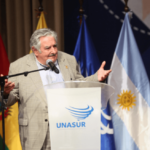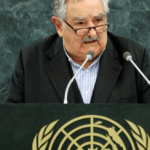The former president of the Republic, José Mujica, affirmed that the world is entering a crossroads because if the economy of wealth accumulation continues to develop along the path of “use and discard” without responsibility, it will collapse with civilization. “The ecological slaughter is just around the corner.”
Mujica said that Latin America is an extremely unfair continent. “Every three days, there will be a new billionaire in Latin America. By the end of next year or the end of next, we can have 240 million poor people and no less than 70 or 80 million people in extreme poverty. Our democracy exists. The fundamental contradiction , because the excessive concentration of wealth eventually becomes an illusion that undermines political decisions.
Challenges of democracy in Latin America
Mujica organized a master class on “Democratic challenges in Latin America” within the framework of the International Course “Countries, politics and democracy in Latin America” organized by the Institute of Latin American and Global Studies organized by the Puebla Group, Latin American Observatory of the State University of Rio de Janeiro, UMET and New School University.
In this context, a question was posed to Mujica, that is, what are the challenges facing democracy in an unjust and convulsed Latin America.
The former president of Uruguay replied that the first spectrum of democracy is serious inequality. “When we talk about equality, we are not talking about building the same bricks. We all spend the same bricks or have the same taste. No! We talk about more or less similar opportunities at the beginning of life, and then everyone will do what they can .. “.
“We are in an extremely unjust continent. Every three days, there will be a new billionaire in Latin America. By the end of the year or the next, we may have 240 million poor people, and there will be no less than 70 or 8,000. Ten thousand people will be found in a state of extreme poverty. There is a fundamental contradiction in our democracy, because the excessive concentration of wealth eventually becomes an illusion that undermines political decisions. In other words, the concentration of wealth is inseparable from the greater influence on political decisions . “
He said that the transnational business economy sometimes has the power of the state, but its main focus is not on the progress of the country, but on the progress of business groups.
Pepe MUJICa
He said: “On the one hand, we have a sovereign state and a nation-state. On the other hand, due to the accumulation of their laws, the economy is becoming more and more independent of the country and its space.”
He regretted that in this world concert the Latin American countries seemed strange to each other. In that sense, he said that a common policy is needed, because otherwise it will become a hunting ground.
“If I give benefits to multinational companies in my little country, and another country gives benefits to other companies, then we will end up hurting ourselves.”
He added: “In all stages of the world we live in, we are all politically ill. Africans are teaching us at least theoretical lessons because they have signed agreements with 54 countries to integrate the economy. And create space for life and circulation in Africa. “.
The former president said that states with more resources are needed. “We must copy China and Vietnam. The country must become a dividend collector, a partner in state activities with the bourgeoisie, not to steal it, but to obtain income parallel to the fiscal line, because the social debt must be reduced.” . He said that if the country is a bad manager, then the bourgeoisie must be left behind, but the country must be used as a partner to collect dividends to allow the economy to grow, but also to allow the country to increase its assets.
Mujica said that the role of the State is decisive, but it does not mean that the State has everything, but that it has resources and can heal social wounds that the market will never be able to repair. “Capitalism must understand this, because otherwise the danger of ecological slaughter is at hand. We have already loosened too many natural constraints and have started charging ourselves bills.”








Leave a Reply